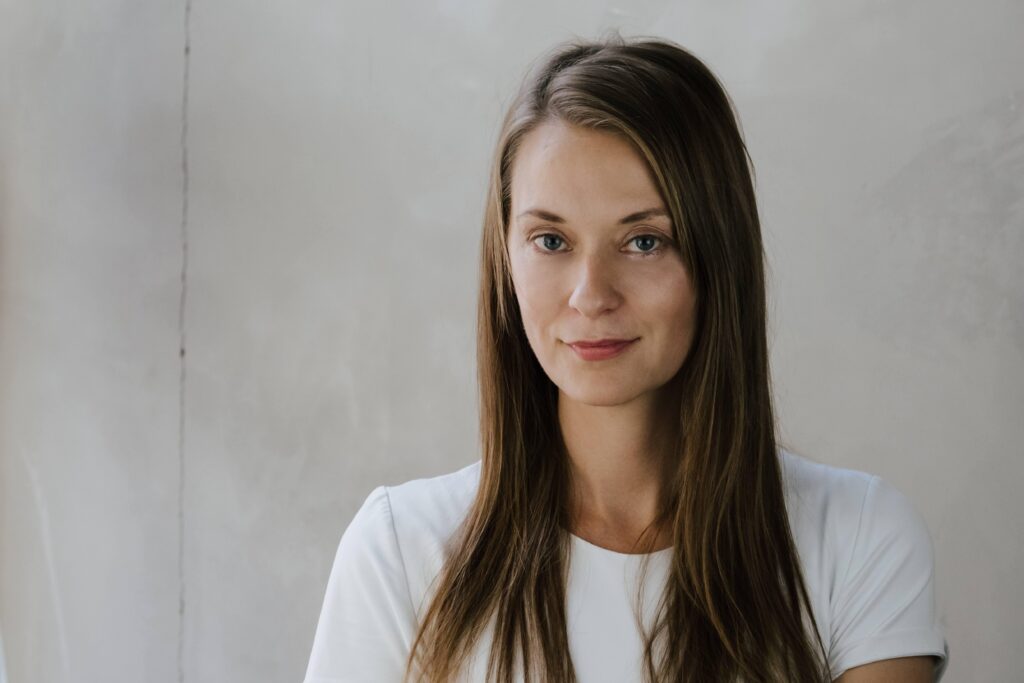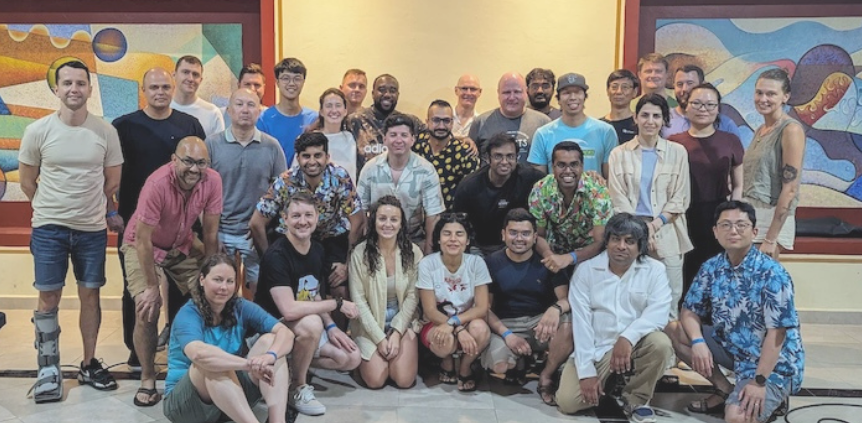In August 2024, CruxOCM announced their Series A funding round of $17M, proudly led by M12. CruxOCM’s platform automates industrial control rooms, enhancing sustainability, profitability, and safety. This investment was made alongside ONEOK, Raven Indigenous Capital Partners and EIC Rose Rock Fund and with continued support from existing investors Angular Ventures, Bullpen Capital, Root Ventures, Industry Ventures, Cendana Capital, Pipeline Capital Partners, and Golden Ventures.
As Michelle Gonzalez, Corporate Vice President and Global Head at M12, put it following the announcement of this funding, “Their innovative technology is set to disrupt the energy sector, enhancing efficiency and safety by providing operators with co-pilot capabilities. This is crucial for our critical energy infrastructure. We look forward to supporting CruxOCM’s growth and seeing their impact on the energy industry.”
In this edition of Founders Feature, we connected with CruxOCM Co-Founder and CEO Vicki Knott to learn about valuable lessons she’s collected in her founding journey, how adaptability and success go hand-in-hand, and her vision for the future of global heavy industrial infrastructure. Here’s what she had to share:
Was there a particular moment or event that made you decide to take the entrepreneurial leap?

Vicki: Yes, there absolutely was a defining moment, though it was more of a gradual realization that culminated in a decisive shift. For years, as a chemical engineer in the energy sector, I was deeply engaged in technical problem-solving. While I excelled in that role, I also found myself consistently looking beyond the immediate technical challenge to the broader strategic implications and asking, “How can we do this better or differently?”
This internal drive became particularly strong when I identified a significant opportunity: adapting proven technologies from other heavy industries to revolutionize the operation of our existing pipeline infrastructure assets. I began championing these innovative approaches internally with my co-founder, Roger Shirt, but I soon encountered the inherent challenges of enacting significant change within well-established, large organizations. It’s not a critique of those companies; rather, it’s a reality that industries operating successfully often have less immediate impetus for disruption.
The “moment” arrived when I realized that my passion wasn’t just about technical innovation, but about implementing transformative solutions and driving market adoption. My personality type thrives on creating, building, and leading change, which wasn’t fully aligning with my role at the time. It became clear that the most effective way to bring these valuable technologies to the energy sector and truly make an impact was to take the entrepreneurial leap myself. It was a calculated decision, fueled by conviction and a clear vision for what could be achieved.
Can you describe a significant pivot or change in strategy that your company has made?
Vicki: Certainly. A significant pivot occurred in the very early days of Crux, and it was a direct result of navigating unforeseen global challenges. When we launched, we were fortunate enough to secure a global energy major as one of our foundational clients. This opportunity, while exciting, pulled us slightly outside of our core expertise. We were initially focused on optimizing Liquefied Natural Gas (LNG) operations for this overseas client, even though our deepest technical and operational experience lay in pipeline infrastructure. We saw it as a valuable chance to demonstrate our technology’s adaptability and expand our footprint.
However, just as we were gaining traction and demonstrating initial success, the COVID-19 pandemic hit, dramatically impacting global logistics and, crucially, causing oil futures to go negative. The practicalities of executing complex projects overseas became incredibly difficult, if not impossible, overnight.
This external shock forced us to re-evaluate our strategy. We made a deliberate decision to pivot back to our fundamental strength: pipeline infrastructure operations. It was a critical strategic shift born out of necessity, but it proved to be a fantastic decision. By focusing on our core competency and leveraging our established expertise, we were able to serve a pressing market need that was less impacted by international travel restrictions, and that strategic clarity ultimately laid the groundwork for the robust growth and success we experience today.
Can you share a mistake you’ve made along the way and what you learned from it?
Vicki: Of course, in any entrepreneurial journey, mistakes are invaluable learning opportunities, and we’ve certainly had our share. One of the most significant early missteps involved a prolonged engagement with a major pipeline operator due to a critical miscommunication regarding our core technology.
In our initial discussions with their operations and procurement teams, we clearly articulated that our software is designed as a “closed-loop system” – similar to an autopilot for commercial airplanes, offering autonomous control for enhanced efficiency and safety. We even provided analogies like adaptive cruise control to clarify this. However, despite our explanations, we failed to adequately confirm that the client’s operations team was truly comfortable with, or even ready for, such a level of automation. It became apparent later that they had tacitly assumed our system would not operate in a closed-loop fashion.
This misunderstanding led to an almost 12-month procurement process and a significant Proof of Concept (POC) effort. It was only deep into this process that we learned directly from their COO that they “would not close the loop under any circumstances.” While they were exceptionally professional and open to exploring an alternative, “open-loop” solution, their requirements for that approach didn’t align with our product roadmap or long-term vision. We mutually decided to part ways.
The key lesson here was profound: it’s not enough to be clear in our communication; we must also actively listen and probe for unspoken assumptions and organizational readiness, especially with early adopters of transformative technology. We realized we needed to implement more rigorous discovery phases to truly understand a client’s risk appetite and technological maturity before committing significant resources.
In a startup environment with minimal resources, every misdirected effort is magnified. This experience fundamentally reshaped our sales qualification process, making us far more effective at identifying and engaging with clients who are genuinely prepared for the innovative solutions we offer, ensuring our efforts yield tangible, impactful returns.
How do you see your company evolving in the next 5-10 years?
Vicki: In the next 5 years, our primary focus is on deepening our penetration within the industrial pipeline operations market. We aim to aggressively expand the implementation of our advanced process control technologies, effectively “closing the loop” on pipeline operations wherever feasible. This isn’t just about market share; it’s about unlocking immense value. With over 2.4 million miles of pipeline in the USA alone, moving millions of barrels of oil and gas equivalent daily, the scale of this opportunity is vast.
Beyond efficiency gains, our technology has a profound impact on safety and environmental performance. Given that approximately 95% of safety and environmental incidents in heavy industry are attributed to human error, reducing human intervention by up to 85% through automation is a game-changer. We’ll achieve this expansion through strategic partnerships, continuous product innovation tailored to specific regional needs, and by demonstrating clear ROI for our clients.
Looking towards the 10-year horizon, we envision leveraging our unique “control room operator-first” design philosophy to expand into additional, synergistic markets within the broader energy sector. Our approach, which prioritizes seamless integration with human oversight and decision-making, makes our technology highly adaptable.
We’ll identify other areas of critical energy infrastructure that can benefit from enhanced efficiency, reliability, and safety through intelligent, control room operator first automation. This expansion will be crucial not only for Crux’s growth but also for strengthening the foundational energy infrastructure that underpins global economic activity, including the burgeoning demands of the AI boom. We’ll explore new applications where our expertise in real-time data analysis, predictive modeling, and human-centric industrial autonomy can create similar transformative impacts.
How did you go about building your team?
Vicki: Building our team at Crux has been a journey of continuous learning and strategic evolution. As a chemical engineer with a background in oil and gas, my initial experience was deeply technical, not in building a software team from the ground up. I quickly recognized this gap.
My first crucial step was partnering with my co-founder, Roger Shirt. His deep industry expertise and reputation immediately brought immense credibility to our vision. Early on, I did make a number of hiring mistakes, primarily due to my inexperience in evaluating software-specific talent and scaling a tech organization. This challenging but valuable learning experience quickly highlighted the need for external guidance.
At that point, I made a deliberate decision to leverage the expertise within our venture capital investor network. Our investors weren’t just capital providers; they were strategic partners who understood the nuances of building high-growth software companies. While Roger and I brought unparalleled domain expertise in the heavy industry problems we aimed to solve, we openly acknowledged that we weren’t experts in the intricacies of software company construction.
Through close collaboration with our investors, we successfully sourced and recruited a stellar executive leadership team, primarily based in key tech hubs like the Bay Area and Texas. These leaders possess the specific software development, product, and go-to-market expertise we needed. They, in turn, have been instrumental in building out their respective teams, which has been the true engine driving our significant growth and innovation. This approach has allowed us to combine deep industry problem knowledge with world-class software execution, creating a truly formidable team.
What legacy do you hope to leave through your work?
Vicki: The legacy I hope to leave through my work at Crux is fundamentally about empowering the frontline operators of our global heavy industrial assets with human-centered industrial autonomy.
Many legacy incumbents are attempting to develop industrial autonomy, but it’s akin to Blockbuster trying to become Netflix – their foundational architecture and operational mindset aren’t inherently designed for this paradigm shift. We, on the other hand, are building from the ground up with a “control room operator-first” design philosophy. This user-centric approach, combined with cutting-edge modern software capabilities, unlocks an unprecedented opportunity to truly modernize the global heavy industrial infrastructure that provides the essential energy powering our lives every day.
Ultimately, my legacy would be to ensure that the individuals who are most critical to these operations – the control room operators – are equipped with the absolute best tools. By enabling them with intelligent human-centered industrial autonomy, we not only drastically increase the efficiency and reliability of our existing energy assets but, more importantly, enhance their safety and sustainability. I want Crux to be synonymous with transforming complex industrial operations into safer, simpler, more efficient, and more human-empowered environments.
